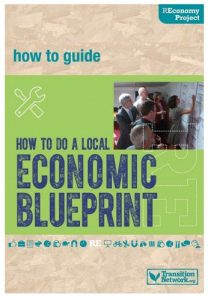Writing a Local Economic Blueprint
Writing a Local Economic Blueprint is one way to make the case for community-led economic relocalisation & to engage people in the discussion about your local economy.
What is an Economic Blueprint?
A Local Economic Blueprint is project that aims to evaluate the economic potential of different sectors within your local economy and identify opportunities for new, community-based economic activity.
Why do an Economic Evaluation?
- Engage your local economic leaders and organisations in a new conversation about your local economy.
- Develop a deeper understanding of your local economy.
- Identify opportunities for new Transition-oriented enterprises, cooperatives & social enterprises.
- Begin to build networks of existing businesses, by sector.
- Support the growth of key resilience-building sectors, such as food, renewable energy, retrofitting.
- Broaden the reach and impact of your Transition Initiative.

Practicalities – Download our guide
The purpose of this ‘How to do an Economic Blueprint’ guide is to provide support for your community group as you pursue the Economic Blueprint process in your own community. It is designed to inform, guide and support you and your group through a self-facilitated process. We’ve broken it down into manageable steps to help make it easy – the short videos below are made to work alongside the guide.
Our Blueprint Learnings
A number of Transition Initiatives have tested the Economic Blueprint Approach and these are some of the things we have learnt.
- Leadership – This process is designed to be facilitated by a community group such as a Transition Initiative, or a community group with similar aims. Blueprint Projects are quite a big undertaking that can be resource heavy. It is important that you identify a person or small group of people with the skills, energy & capacity to drive the project forward. (These may be a paid roles – see funding below).
- Team Effort – Blueprint projects have been most effective when different players in the local economy have come together to work on the report (e.g. Transition Initiative representatives, Local Councillors, Business Owners, Colleges, Public Sector commissioners). In these cases the Blueprint process itself has helped Transition Groups develop new, constructive relationships that have lead to further joint working after the report itself had been completed. In contrast where Transition Initiatives have commissioned researchers to carry out the Blueprints on their behalf, groups have missed the opportunity to engage people in the process and at the end of the project they have found it difficult to move ideas into action.
- Funding – The first 3 Transition Initiatives that completed the Economic Blueprint process each had a budget of roughly £10,000-£15,000, covering around 75 days worth of effort, plus some costs. The groups found that it was not viable to run this process on volunteer effort alone. Economic Blueprints can be a great way of making your case, but this can feel like a daunting amount of money for groups to raise – especially for those who are just starting to think about Local Economy work. If so, don’t despair as there are lots of other things you can do to get started. One idea might be to hold a stakeholder event that looks at Blueprints from other places and/or statistics that are applicable to all communities (e.g. Local Multiplier Effect), and explores how these ideas or examples might be adapted in your area.
- Skills – You also need access to the required skills including project management, data analysis, report writing, report design and people who can interact credibly with senior people from a range of organisations. Ideally, you have some existing relationships with key organisations in your community, and some track record of catalysing change there.
-
-
Getting Started
-
-
-
Stakeholders
-
-
-
Analysis
-
-
-
Action Plan
-
Find out more from other Economic Evaluation and Economic Relocalisation approaches & initiatives
- Community Economic Development Plans – UK Government Funded approach to local economic planning, currently in it’s second year
- Preston Model – One approach to re-localisation of public sector spending
- Mondragon – an inspiring story from Spain
- Community Wealth Building – information and resources from the U.S.A.







Connect